Same Name, Different Fate
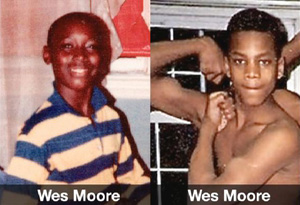
The similarities are striking. Two boys from Maryland were raised by single mothers in rough neighborhoods. Surrounded by drug dealers, gun violence and gang activity, each man struggled to make a name for himself. The name? Wes Moore.
These men may share a name, but they had very different destinies. One Wes Moore is a Rhodes Scholar, a White House fellow and a Wall Street hotshot. The other Wes Moore was convicted of killing a police sergeant and will spend the rest of his days in a 6-by-8-foot prison cell.
"When you hear this story, it's going to turn the way you think about free will and fate upside down," Oprah says.
In 2005, these men met for the first time and began to explore how their lives diverged so drastically. Wes, an Army-veteran-turned-author, shares their experiences in his first book, The Other Wes Moore.
These men may share a name, but they had very different destinies. One Wes Moore is a Rhodes Scholar, a White House fellow and a Wall Street hotshot. The other Wes Moore was convicted of killing a police sergeant and will spend the rest of his days in a 6-by-8-foot prison cell.
"When you hear this story, it's going to turn the way you think about free will and fate upside down," Oprah says.
In 2005, these men met for the first time and began to explore how their lives diverged so drastically. Wes, an Army-veteran-turned-author, shares their experiences in his first book, The Other Wes Moore.
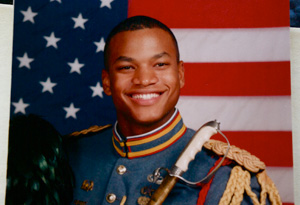
As a toddler, Wes, the book's author, had a loving family, successful parents and a nice home in Maryland. Then, when he was just 3 years old, his life took a dramatic turn. His father died suddenly from a rare virus. Unable to raise three children on her own, Wes' mother, Joy, moved her family to the Bronx to live with her parents.
Joy enrolled her children in a respected private school across town in an attempt to protect them from the drugs and gangs infiltrating their neighborhood. Young Wes soon discovered how hard it was to straddle both worlds.
"I was very lost during that period," Wes says. "I found myself quickly becoming too rich for the kids in the neighborhood and too poor for the kids at school."
Wes became a troublemaker. He says he set off smoke bombs in lockers, skipped school and was even picked up by the police. When Joy realized she was starting to lose her son, she decided to take action.
After years of telling Wes she would send him away to military school, she made good on her threat. Wes' grandparents mortgaged their home so they could afford to send their 12-year-old grandson to a Pennsylvania military school.
"I didn't want to be there," Wes says. "I ran away five times in the first four days, but I started to begin to think about why I was there and about the opportunity that this was to really reshape my identity and do something different."
Joy enrolled her children in a respected private school across town in an attempt to protect them from the drugs and gangs infiltrating their neighborhood. Young Wes soon discovered how hard it was to straddle both worlds.
"I was very lost during that period," Wes says. "I found myself quickly becoming too rich for the kids in the neighborhood and too poor for the kids at school."
Wes became a troublemaker. He says he set off smoke bombs in lockers, skipped school and was even picked up by the police. When Joy realized she was starting to lose her son, she decided to take action.
After years of telling Wes she would send him away to military school, she made good on her threat. Wes' grandparents mortgaged their home so they could afford to send their 12-year-old grandson to a Pennsylvania military school.
"I didn't want to be there," Wes says. "I ran away five times in the first four days, but I started to begin to think about why I was there and about the opportunity that this was to really reshape my identity and do something different."
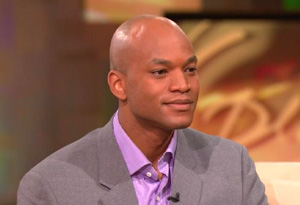
Over the next six years, the troubled teen grew into an academic superstar and community leader. When Wes graduated, he was the highest-ranking student out of 750 military cadets...and his accomplishments didn't end there.
Wes landed an internship with the mayor of Baltimore and earned degrees in international relations and economics from Johns Hopkins University. Then, at age 22, he was awarded a Rhodes Scholarship to study at the University of Oxford.
The day after receiving this prestigious honor, the Baltimore Sun ran a story about Wes. "[They] did a piece on my life and my childhood and how I was a local kid who had just received this full scholarship to Oxford," he says. "But the thing that really hit me was, at the same time, there was a whole series of articles about the murder of a police officer."
One of the men wanted in the police officer's murder was also named Wes Moore. Joy says she was terrified for her son. "There are wanted posters all over our neighborhood looking for 'Wes Moore,'" she says.
From the article, Wes learned that on February 7, 2000, a jewelry store robbery ended with the murder of an off-duty Baltimore police officer, Sgt. Bruce Prothero. Bruce was chasing four armed robbers when he was shot at point-blank range. He left behind a wife and five young children.
Investigators were on the hunt for four suspects, including a man named Wes Moore and his brother Tony.
Wes landed an internship with the mayor of Baltimore and earned degrees in international relations and economics from Johns Hopkins University. Then, at age 22, he was awarded a Rhodes Scholarship to study at the University of Oxford.
The day after receiving this prestigious honor, the Baltimore Sun ran a story about Wes. "[They] did a piece on my life and my childhood and how I was a local kid who had just received this full scholarship to Oxford," he says. "But the thing that really hit me was, at the same time, there was a whole series of articles about the murder of a police officer."
One of the men wanted in the police officer's murder was also named Wes Moore. Joy says she was terrified for her son. "There are wanted posters all over our neighborhood looking for 'Wes Moore,'" she says.
From the article, Wes learned that on February 7, 2000, a jewelry store robbery ended with the murder of an off-duty Baltimore police officer, Sgt. Bruce Prothero. Bruce was chasing four armed robbers when he was shot at point-blank range. He left behind a wife and five young children.
Investigators were on the hunt for four suspects, including a man named Wes Moore and his brother Tony.
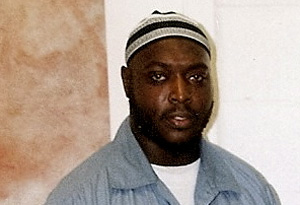
After 12 days on the run, the Moore brothers were captured. To avoid the death penalty, Tony pled guilty to the shooting and was sentenced to life in prison.
The other Wes Moore, a career criminal, claimed he was not at the murder scene, but he eventually was found guilty of first-degree felony murder.
Wes says he was haunted by his criminal counterpart's story. "It was something I couldn't escape," he says. "It was something that just kept on eating at me. I knew I just had to learn more, and I had to understand: How did this happen? How did two kids from similar neighborhoods, from similar type of backgrounds, end up in completely different places?"
Years later, after Wes finished his time at Oxford and began a career in finance, he decided to reach out to the other Wes Moore. "I said: 'You know what? The fact that this is still eating at me means I need to do something about it,'" he says.
The other Wes Moore, a career criminal, claimed he was not at the murder scene, but he eventually was found guilty of first-degree felony murder.
Wes says he was haunted by his criminal counterpart's story. "It was something I couldn't escape," he says. "It was something that just kept on eating at me. I knew I just had to learn more, and I had to understand: How did this happen? How did two kids from similar neighborhoods, from similar type of backgrounds, end up in completely different places?"
Years later, after Wes finished his time at Oxford and began a career in finance, he decided to reach out to the other Wes Moore. "I said: 'You know what? The fact that this is still eating at me means I need to do something about it,'" he says.
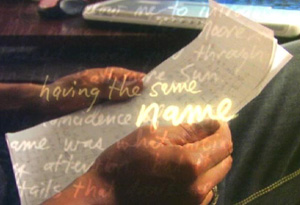
In 2005, Wes wrote the other Wes Moore a three-page letter and mailed it to him at the Jessup Correctional Institution. The letter started with a simple introduction:
"Dear Wes: Please allow me to introduce myself. My name is Wes Moore, and I learned about you through articles in the Baltimore Sun. ... The coincidence of us having the same name was what initially caught my attention. But it was the other details that drove me to want to learn more."
The day after he mailed the letter, Wes says he thought he'd made a mistake. "I wasn't sure how he'd react," he says. "I thought, in retrospect, even after I wrote the letter I thought my questions seemed odd."
To his surprise, Wes received a response from the other Wes Moore one month later. "He first just thanked me for reaching out to him. He said, 'When you're in here, you think people don't even know you're alive anymore,'" Wes says. "He said how much it meant for him to receive that letter, and then he just began to rattle off answers to the questions I asked."
Wes learned more about this convicted murderer's mother, brother and children. Over time, the first letter sparked dozens more.
"Dear Wes: Please allow me to introduce myself. My name is Wes Moore, and I learned about you through articles in the Baltimore Sun. ... The coincidence of us having the same name was what initially caught my attention. But it was the other details that drove me to want to learn more."
The day after he mailed the letter, Wes says he thought he'd made a mistake. "I wasn't sure how he'd react," he says. "I thought, in retrospect, even after I wrote the letter I thought my questions seemed odd."
To his surprise, Wes received a response from the other Wes Moore one month later. "He first just thanked me for reaching out to him. He said, 'When you're in here, you think people don't even know you're alive anymore,'" Wes says. "He said how much it meant for him to receive that letter, and then he just began to rattle off answers to the questions I asked."
Wes learned more about this convicted murderer's mother, brother and children. Over time, the first letter sparked dozens more.
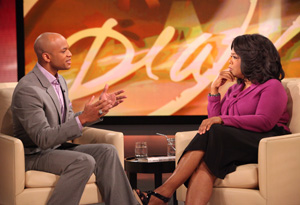
After exchanging dozens of letters, Wes decided to visit the other Wes Moore in prison. "Having the chance to actually see and sit across from the other Wes Moore was something that was just a completely surreal experience," he says.
At first, Wes says they were cautious around each other. "We were telling each other answers that we thought the other person wanted to hear," he says. Then, Wes' questions got more pointed and poignant.
Wes asked the other Wes Moore things like, "When did you first know you were a man?"
"The time he first realized [he was a man] was when he felt like there were actually other responsibilities that he had on his shoulders," Wes says. "Then, I remember him throwing the question back at me, and it was a question I hadn't even really fully thought about yet. I think both of us were talking about ... not having fathers in the home."
The only difference? The other Wes Moore said his father chose not to be in his life, while Wes' father died.
Since that first meeting, Wes has returned to Jessup Correctional Institution more than two dozen times. He's come to know the man who shares his name, as well as this man's friends and family.
At first, Wes says they were cautious around each other. "We were telling each other answers that we thought the other person wanted to hear," he says. Then, Wes' questions got more pointed and poignant.
Wes asked the other Wes Moore things like, "When did you first know you were a man?"
"The time he first realized [he was a man] was when he felt like there were actually other responsibilities that he had on his shoulders," Wes says. "Then, I remember him throwing the question back at me, and it was a question I hadn't even really fully thought about yet. I think both of us were talking about ... not having fathers in the home."
The only difference? The other Wes Moore said his father chose not to be in his life, while Wes' father died.
Since that first meeting, Wes has returned to Jessup Correctional Institution more than two dozen times. He's come to know the man who shares his name, as well as this man's friends and family.
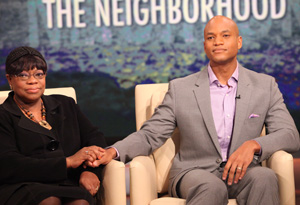
Wes set out to discover how two men with similar backgrounds and the same name could lead such different lives. Now, he knows there's no simple answer.
"I think raising children is complicated," Wes says. "I think particularly in this environment, and particularly for those who grow up in the most precarious communities, it is a very challenging and daunting prospect to raise a child."
Wes credits his family and mentors for his success. "I was so fortunate and lucky to have people in my life who said: 'You know what, Wes? We're going to get you across that finish line, kicking and screaming if we need to. But we're going to get you across that finish line,'" he says. "They were there for support. They were there to give my mother the leverage that she needed."
Education also played a major role in his life. "I think education taught me critical thinking. I think education showed me a world I never knew existed," Wes says. "My grandfather used to say that education is like a skeleton key. If you can get that skeleton key, it can open any door."
"I think raising children is complicated," Wes says. "I think particularly in this environment, and particularly for those who grow up in the most precarious communities, it is a very challenging and daunting prospect to raise a child."
Wes credits his family and mentors for his success. "I was so fortunate and lucky to have people in my life who said: 'You know what, Wes? We're going to get you across that finish line, kicking and screaming if we need to. But we're going to get you across that finish line,'" he says. "They were there for support. They were there to give my mother the leverage that she needed."
Education also played a major role in his life. "I think education taught me critical thinking. I think education showed me a world I never knew existed," Wes says. "My grandfather used to say that education is like a skeleton key. If you can get that skeleton key, it can open any door."

The prison where the other Wes Moore is serving his life sentence denied The Oprah Show's request for an interview because he's a convicted murderer and the relatives of the police sergeant did not want him interviewed. "I certainly respect that," Oprah says.
After dozens of meetings and letters, Wes uses his knowledge to speak to the other Wes Moore's character. "[He] is very similar to a lot of us," Wes says. "He's conflicted. He loves his children. He loves his mother."
In fact, Wes says he was surprised to discover how men in such different positions are ultimately more alike than they are different.
"That was actually one of the things I really discovered about Wes as I first got to know him— just how similar we were," he says. "I realized how passionate he is about his children and how much he wants to help other people who are now in prison."
After dozens of meetings and letters, Wes uses his knowledge to speak to the other Wes Moore's character. "[He] is very similar to a lot of us," Wes says. "He's conflicted. He loves his children. He loves his mother."
In fact, Wes says he was surprised to discover how men in such different positions are ultimately more alike than they are different.
"That was actually one of the things I really discovered about Wes as I first got to know him— just how similar we were," he says. "I realized how passionate he is about his children and how much he wants to help other people who are now in prison."
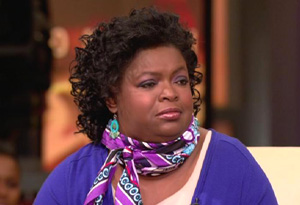
Mary Moore, the mother of the other Wes Moore, says she lost control of her son when he was just a boy.
While this single mother worked to support her family, she says her children were left home with little supervision. "I could barely afford to pay bills, nevertheless a babysitter," she says. "The trouble was here. It was all around, so you couldn't avoid it."
Mary says her son became involved with drugs and started committing crimes when he was just 11 or 12 years old. "He figured that doing crime, selling drugs was a way out...a way to get the things that we couldn't afford," she says.
Looking back, Mary says she wishes there were some things she'd done differently. "I just wasn't aware of the options that were out there," she says. "I didn't have the resources. I didn't have the education. I didn't have the support."
With the right guidance and resources, Mary says her son may have done something positive with his life. "He has goals and things that he wanted to do," she says. "He wanted to be a rapper. He wanted to write books."
While this single mother worked to support her family, she says her children were left home with little supervision. "I could barely afford to pay bills, nevertheless a babysitter," she says. "The trouble was here. It was all around, so you couldn't avoid it."
Mary says her son became involved with drugs and started committing crimes when he was just 11 or 12 years old. "He figured that doing crime, selling drugs was a way out...a way to get the things that we couldn't afford," she says.
Looking back, Mary says she wishes there were some things she'd done differently. "I just wasn't aware of the options that were out there," she says. "I didn't have the resources. I didn't have the education. I didn't have the support."
With the right guidance and resources, Mary says her son may have done something positive with his life. "He has goals and things that he wanted to do," she says. "He wanted to be a rapper. He wanted to write books."
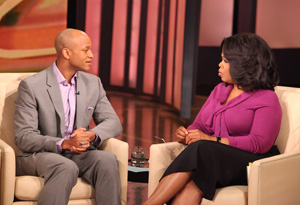
Some critics may assume that Wes' book glorifies a criminal, but he says that was never his intention. "I think when you read the book and you understand the stories, you see that in no way is this a glorification," he says. "There are important lessons that can be learned from this story."
Wes says he certainly learned one chilling truth—the other Wes Moore's story could have been his.
"After doing 200 hours of interviews with Wes and his family and my friends and my family, I realized how little separates us from another life altogether," he says. "Had it not been for some significant and pretty creative intervention in my life and a lot of luck and support, and quite honestly, some tentative steps in the right direction, I could have easily gone down the wrong path."
Wes says he certainly learned one chilling truth—the other Wes Moore's story could have been his.
"After doing 200 hours of interviews with Wes and his family and my friends and my family, I realized how little separates us from another life altogether," he says. "Had it not been for some significant and pretty creative intervention in my life and a lot of luck and support, and quite honestly, some tentative steps in the right direction, I could have easily gone down the wrong path."



